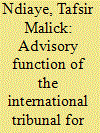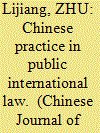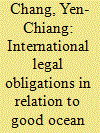| Srl | Item |
| 1 |
ID:
098766


|
|
|
|
|
| Publication |
2010.
|
| Summary/Abstract |
The advisory function can be assessed as a fallback procedure at a time when there is a lack of cases before international courts and tribunals. Although not legally binding and having no precedential effect, Advisory Opinions are generally accepted. This paper looks into the question of the Advisory Opinions in the International Tribunal for the Law of the Sea (ITLOS) system. The advisory function of the Tribunal is exercised by the Seabed Disputes Chamber within the terms of the United Nations Convention on the Law of the Sea. The first request for an advisory opinion was filed on 14 May 2010. The full Court may, however, render an advisory opinion based on other international agreements according to Article 138 of the Rules of the ITLOS. As a rule, the advisory procedure is open to international organizations only. There are neither claims nor parties involved in this procedure. The paper tries to address the legal regime relating to the Opinions.
|
|
|
|
|
|
|
|
|
|
|
|
|
|
|
|
| 2 |
ID:
098768


|
|
|
|
|
| Publication |
2010.
|
| Summary/Abstract |
This survey covers materials reflecting Chinese practice in 2009 relating to: I. Fundamental principles of international law (Five principles of peaceful coexistence; Rule of law at the national and international levels); II. International law of the treaties (Reservation to treaties); III. China's territorial integrity (Taiwan; Tibet; Disputed territories with India; Diaoyu Island and its adjacent islets; Xisha Islands; Nansha Islands and Huangyan Island in Zhongsha Islands; Danwan Reef in Nansha Islands); IV. International law of the sea [Development of Tianwaitian oil and gas field in the East China Sea; China's continental shelf beyond 200 nautical miles; Position on Japan's Submission to the Commission on the Limits of the Continental Shelf; Position on the Joint Submission by Malaysia and the Socialist Republic of Vietnam to the Commission on the Limits of the Continental Shelf; Position on the Submission by the Socialist Republic of Vietnam to the Commission on the Limits of the Continental Shelf; Position on the delimitation of the outer continental shelf beyond 200 nautical miles; US Navy surveillance vessel's activities in China's exclusive economic zone (EEZ); International Seabed Authority; International Tribunal for the Law of the Sea (ITLOS); International fisheries conservation and management; Maritime security and freedom of navigation; Somali piracy]; V. International law on civil aviation (Inapplicability of 1929 Warsaw Convention; Applicability of the 1929 Warsaw Convention; Application of Security Manual for Safeguarding Civil Aviation against Acts of Unlawful Interference of the ICAO); VI. International law on outer space (Peaceful use of outer space; International cooperation in peaceful use of outer space); VII. International human rights law [General positions on human rights; Submission of first national report to the Universal Periodic Review (UPR); Submission of the 10th, 11th, 12th and 13th periodic reports to the Committee on the Elimination of Racial Discrimination (CERD); Implementation of human rights instruments; Office of High Commissioner for Human Rights (OHCHR); National Human Rights Action Plan; Expulsion of aliens; The case of Akmal Shaikh; Refugees; Urge to repatriate Uighur terrorist suspects in Guantanamo to China; Death penalty on Tibetan criminals in Lhasa March 14 Incident; Re-education through Labour (RTL); Rights of the child; Rights of the persons with disabilities; China re-elected to the UN Human Rights Council; Chinese member re-elected to the Committee against Torture (CAT)]; VIII. International humanitarian law (Respect for international humanitarian law; Protection of women in armed conflicts; Protection of civilians in armed conflicts; Christie's auction of Yuanmingyuan relics/return or restitution of cultural property to the countries of origin; Memorandum of Understanding concerning the Imposition of Import Restrictions on Categories of Archaeological Materials from the Paleolithic Period through the Tang Dynasty and Monumental Sculpture and Wall Art at Least 250 Years Old with the United States of America; Right of the Chinese citizens to claim compensation in the 1972 Sino-Japan Joint Statement); IX. International law on disasters (Protection of persons in the event of disasters; Humanitarian and disaster relief assistance of the United Nations); X. International law on disarmament, non-proliferation and arms control [Nuclear non-proliferation and nuclear disarmament; Biological Weapons Convention; Convention on Certain Conventional Weapons (CCW); CCW/landmines; CCW/explosive remnants of war; CCW/cluster munitions; Small arms and light weapons (SALW); Arms Trade Treaty (ATT)]; XI. International criminal law [The Bashir case before International Criminal Court (ICC); Scope and application of universal jurisdiction; Responsibility to protect; Criminal accountability of United Nations officials and experts on mission; Measures to eliminate international terrorism; Taking
|
|
|
|
|
|
|
|
|
|
|
|
|
|
|
|
| 3 |
ID:
098764


|
|
|
|
|
| Publication |
2010.
|
| Summary/Abstract |
Modern warfare and the war on terror against mainly non-State actors have obliged States to resort to innovative measures which blur the limits between jus in bello and jus ad bellum and create a legal oxymoron where the same measures constitute international law violations should they be perceived under jus in bello and legitimate means of self-defense should they be seen under the lens of self-defense and jus ad bellum. In order to demonstrate the particular axiom the note will use the Israeli-Palestinian conflict as a factual and normative framework and will put under its kaleidoscope the post-disengagement Israeli measures towards Gaza.
|
|
|
|
|
|
|
|
|
|
|
|
|
|
|
|
| 4 |
ID:
098767


|
|
|
|
|
| Publication |
2010.
|
| Summary/Abstract |
At present, the concept of good ocean governance is articulated in the literature only. This paper adopted eight elements of good governance as an analytical framework, namely, the rule of law, participatory, transparency, consensus-based decision making, accountability, equity and inclusiveness, responsiveness and coherence. These elements are partially supported by international treaty practice but have not yet received universal acceptance.
|
|
|
|
|
|
|
|
|
|
|
|
|
|
|
|
| 5 |
ID:
098765


|
|
|
|
|
| Publication |
2010.
|
| Summary/Abstract |
This paper examines bilingual court proceedings in China, comparing China's approach on this issue to international standards in major treaties and agreements. Many of the principles of these international agreements are already in place and in use in China. China has adopted some practices transcending international standards such as prohibiting discrimination on grounds of language, informing the accused of his or her offence in his or her language, providing an interpreter at court proceedings and allowing a minority language to be used as an official language in minority regions. With the development of China's economy and the promotion of freedom of movement in China, the need for bilingual courts has greatly increased, particularly in minority regions. This paper explores bilingual judicial practice in China under the auspices of these international treaties.
|
|
|
|
|
|
|
|
|
|
|
|
|
|
|
|